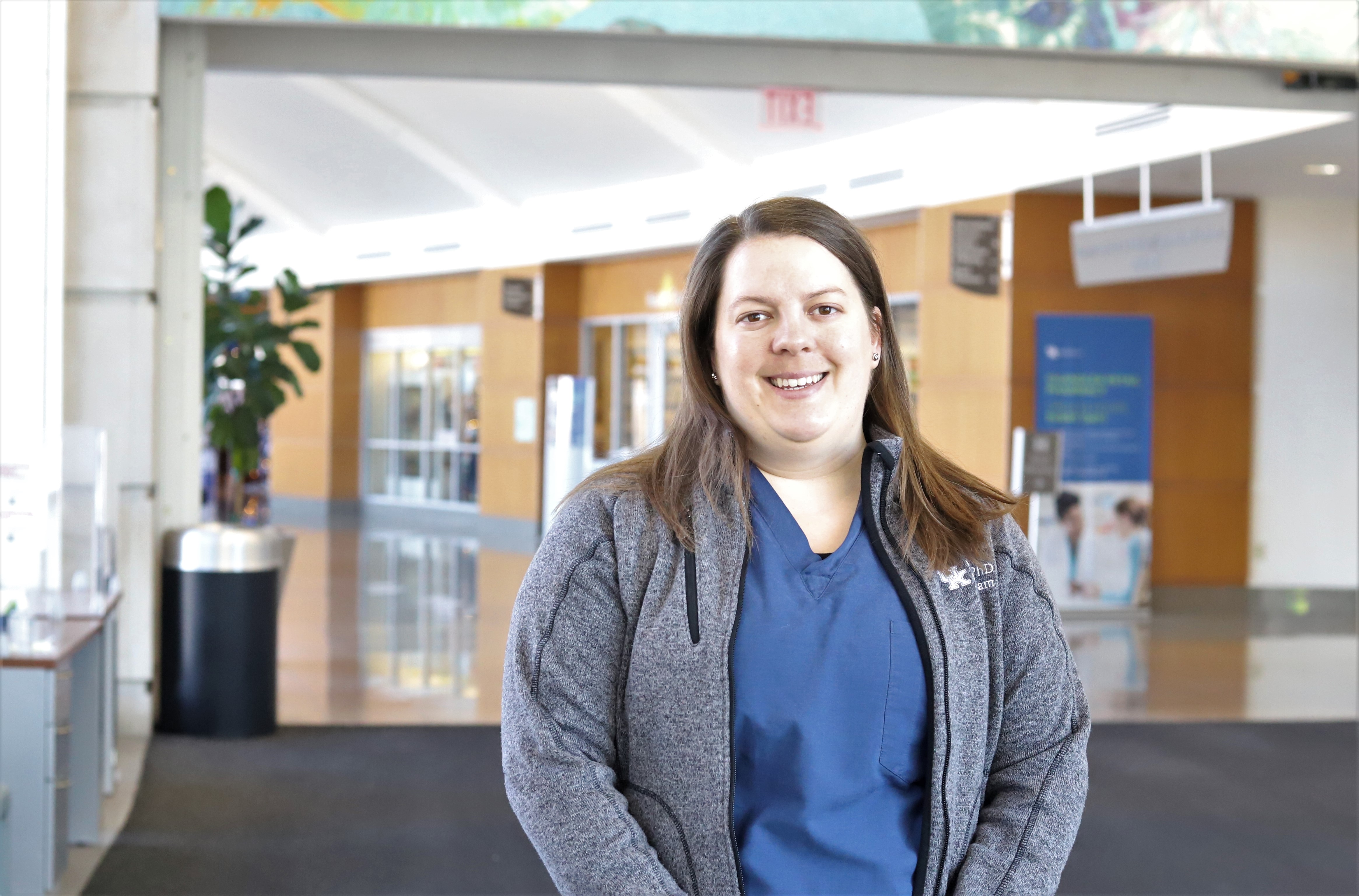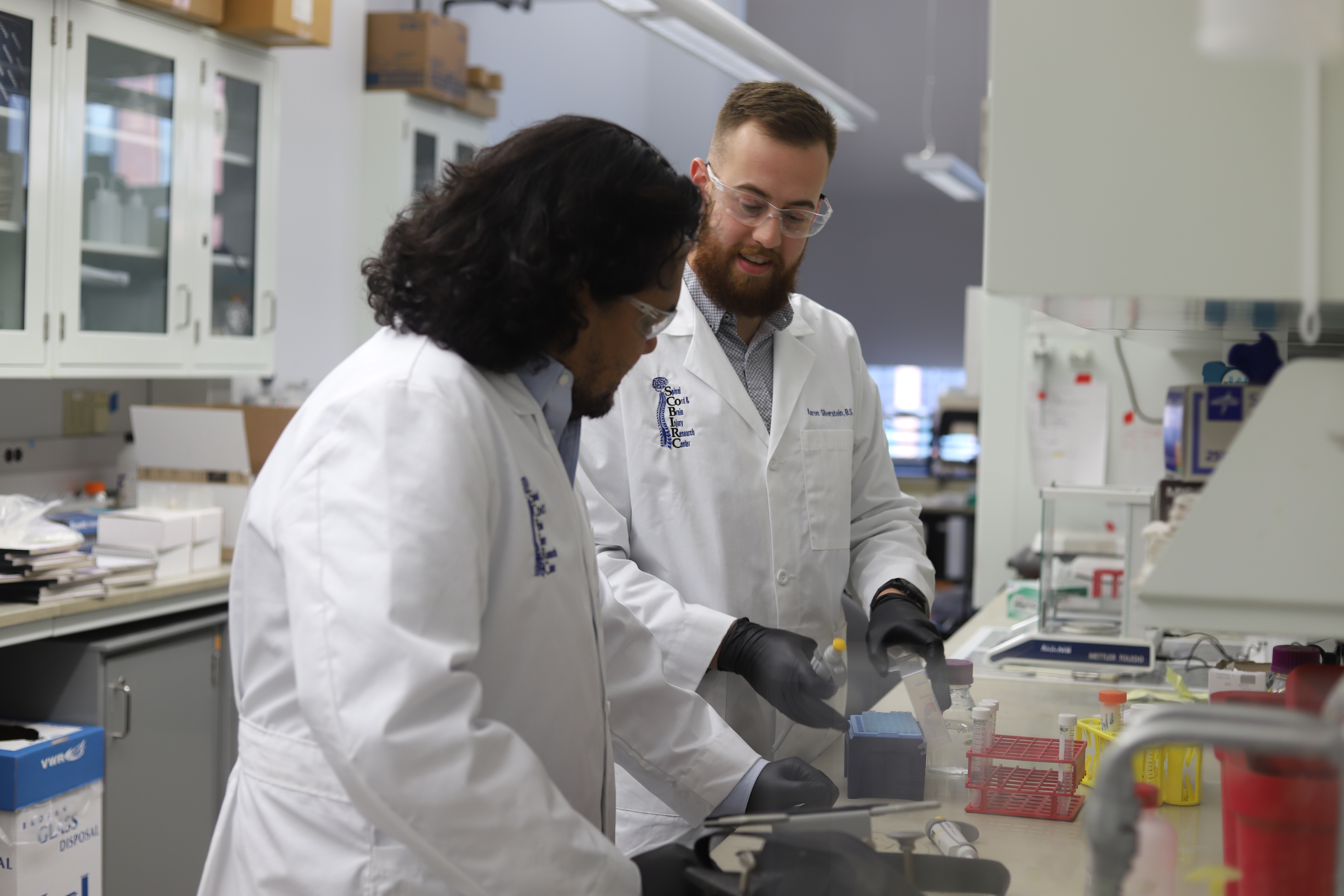Laura Krueger and Aaron Silverstein share the same career aspiration. They want to become physician-scientists, which will allow them to fulfill both of their passions – medicine and research. While they are both on the same trajectory, they didn’t quite get to this career path the same way.
After earning her undergraduate degree, Krueger spent two years working on staff at Cincinnati Children’s Hospital. There, she networked with a resident who had an MD and PhD, and being exposed to the daily life of a physician-scientist in the hospital setting inspired her to go back to school.
Meanwhile, Silverstein thought his career path was cemented on the clinical side. The Paducah, Ky., native wanted to become a clinical psychologist, but it was exposure to the research side of training that sold him on the combined degree. His undergraduate mentor Warren Alilain, PhD, associate professor of neuroscience, allowed him to attend a conference to explore recent findings, network with fellow trainees, and meet the scientists who authored papers he read in class. From there, he “fell in love” with both fields of study.
To achieve their shared goal, Krueger and Silverstein are in the University of Kentucky College of Medicine’s MD/PhD program, a growing combined degree program with the infrastructure to thoroughly prepare students for well-rounded careers in medicine, research, and academia – no matter which dream they have at the beginning of training. As UK’s MD/PhD program continues to grow, more and more trainees are realizing their full potential.
***
According to the Association of American Medical Colleges (AAMC), the MD/PhD career “is busy, challenging, rewarding, and offers opportunities to do good for many people by advancing knowledge, developing new treatments for diseases, and pushing back the boundaries of the unknown.”
“These are people who can bridge both worlds,” said program director Sidney Whiteheart, PhD. “They’re basic scientists doing experiments, understanding the disease, and then they know the medical science of using that knowledge to treat patients.”
The MD/PhD program recruits and trains students from the Commonwealth and across the country. With six health care colleges within walking distance on one campus, UK possesses a solid structure and collaborative atmosphere, and because of this, is uniquely poised to host this kind of multidisciplinary program. The UK College of Medicine’s holistic training begins with the first two years of medical school and closes with the final two years of medical school. In between, in years three through six, students complete their PhD. The College of Medicine collaborates with UK’s colleges of arts and sciences, engineering, pharmacy, and public health to provide multiple disciplines to pursue graduate training. These include traditional biomedical specialties such as anatomy, biochemistry, pharmacology, physiology, and toxicology, but also biomedical engineering, epidemiology, gerontology, and biostatistics.
“There’s a broad approach to our program. We engage more of the University, and that enables students to pursue their interests,” said co-program lead Richard King, MD, PhD. “That means when they finish the program, they’ve had a much more tailored type of experience that they can then use to build up to that next step in their careers.”
Upon completion of the program, most students will then apply for residency and officially enter the medical field with foundational basic science knowledge. More than 80% of UK’s MD/PhD graduates have remained in academic medicine.
To leadership, the MD/PhD program is not just about helping students earn credentials. Dr. King said MD/PhD students gain a “good chance to fail, and to learn from those failures” so that they are not afraid to try new things. The PhD side of training teaches them how to approach new ideas, understand limitations, and test hypotheses. Dr. King said these skills require “time to nurture and to perfect,” which UK’s MD/PhD training program provides.
When co-program lead Christopher Simmons, MD, PhD, mentors trainees, he emphasizes the experiences that the program provides to set realistic expectations for students based on their career interests. He is an alumnus of UK’s program, and he knows how important that was for him.
“A lot of those skills come down to, ‘Can you think critically? Can you appraise the literature? Can you write an outstanding grant? And can you form meaningful relationships with peers who will help you to continue on a track record of success?’” Dr. Simmons said.
***
Silverstein is now a second-year graduate student who studies spinal cord injury through the UK Spinal Cord and Brain Injury Research Center. Silverstein has trained under Dr. Alilain since undergrad, but he has been able to collaborate with faculty, staff, and students in other labs and departments – and the training has evolved.
In early years, Silverstein read papers, learned techniques, and asked a lot of questions. He then began his first research projects and published his first paper during his first year of medical school. As part of his PhD training, he formed an advisory committee of five to six faculty. He just passed his qualifying exam for his PhD, and a major task in that process was composing a grant proposal. Through it all, Silverstein has been impressed by how faculty – from both the medical and scientific side – are willing to take time to provide resources and expertise. UK protects the time of its faculty so they are available to students, and so they can continuously develop their mentorship abilities.
“I think the collaborative environment that we’re in at UK is one of the most impactful components of my training,” Silverstein said. “It’s not there at every university that I visited or interviewed when I was looking at MD/PhD programs.”
After earning his PhD, the next step for Silverstein will be his third year of medical school – which is where Krueger is currently. She agrees that the collaborative atmosphere has been crucial to her success on both the clinical and basic science sides of training. The MD/PhD program, she said, is positioned at a campus that includes all the resources and support that students need to succeed, but it is also tight-knit so students can lean on each other.
“We’re a very collegial group that recognizes that we are all going to be colleagues, that we all need each other’s help in certain things,” she said. Krueger completed her doctorate in the lab of Ann Morris, PhD, in the UK College of Arts and Sciences, where she studied the genetics of eye and retinal cell development. This fall, she began her clinical clerkships and looks forward to her fourth year when she will prepare for the residency match.
Her training at UK will help her achieve her dream of becoming a pediatric geneticist. Meanwhile, Silverstein wants to pursue neurosurgery, with dreams of holding a faculty appointment and running his own lab.
***
The future looks bright for the UK College of Medicine’s MD/PhD trainees like Silverstein and Krueger – and for the program itself. Leadership has worked toward key goals including the expansion of learning opportunities, enhancement of diversity within the program, and the increase in number of students to prepare more physician-scientists. They have continued to meet these goals as the number of total trainees has grown to 32, with six students in the current M1 class – the program’s largest and most diverse class ever.
As the program develops, leadership continues to implement new career-building opportunities. Recently, they added a monthly clinical case study and program meetings focusing on career skills.
Beth Garvy, PhD, senior associate dean for biomedical education, said UK’s program began in 1988, yet it competes with programs that are much more established – some up to 50 years old. She said the big goal for the program is to get National Institutes of Health funding, which would help validate the program’s strengths and help advance education, research, and clinical care in the Commonwealth.
“Our success really relies on success in recruiting, success of the students, success of our mentors,” Dr. Garvy said, “and I think we’re really moving in a positive direction.”
You can support our MD/PhD students by visiting uky.networkforgood.com. In the top right search bar, enter “MD and PhD Scholarship Program” or the fund number, “1215380680 420100.” Then click the gray “donate” button and fill out your payment information.

